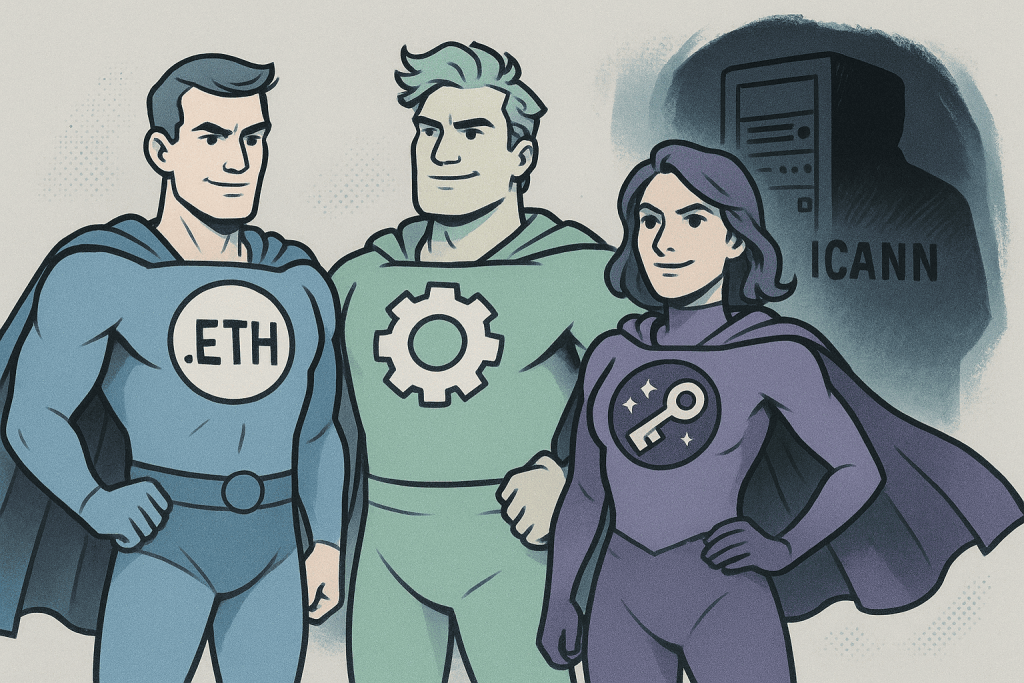
In today’s Internet, the domain name system is centrally managed by ICANN. But with the development of Web3, alternative approaches to domain management are emerging — decentralized DNS systems that operate independently of the traditional infrastructure. Among the best-known are ENS, Handshake, Unstoppable Domains, and others. They open up new possibilities for users, entrepreneurs, and developers seeking greater autonomy and security in the digital environment.
Why Do We Need Alternatives to ICANN?
The centralized DNS model has several drawbacks:
- the possibility of censorship or domain blocking;
- dependence on regulators and intermediaries;
- loss of domain control in case of policy violations;
- vulnerability to attacks on DNS servers.
This problem is especially relevant for countries with strict digital restrictions, where access to information may be limited at the state level. Decentralized solutions offer a new model — where the domain fully belongs to the owner, without requiring registration with a central operator. Moreover, these systems are designed for uninterrupted access, even if the traditional DNS is blocked.
ENS — Ethereum Name Service
ENS (Ethereum Name Service) is a decentralized domain name service that operates on the Ethereum blockchain. It allows you to create domains with the .eth extension that can be linked to crypto wallets, websites, IPFS resources, and other data. ENS integrates easily into Web3 infrastructure and has become popular among decentralized applications (dApps).
Key features of ENS:
- The domain is an NFT that belongs to the wallet owner.
- DNS records can be managed directly via smart contracts.
- Supports integration with browsers, dApps, and crypto wallets.
- No annual renewal fees if the domain is purchased long-term.
- Allows delegation of subdomains (e.g., blog.name.eth).
ENS is widely used in DeFi, NFT platforms, DAO tools, and digital identities.
Handshake — An Alternative to Root Zones
Handshake is a decentralized platform that allows the creation of your own TLDs (like .mybrand, .company, .market) without involving ICANN. Each TLD is stored on the blockchain, and the owner has full control over it. This opens opportunities for launching independent DNS zones, which is especially appealing for large communities or tech brands.
What Makes Handshake Different:
- Ability to act as a “registrar” of your own zone.
- Direct domain ownership without intermediaries.
- Resistant to censorship.
- Uses its own cryptocurrency for registration.
- High flexibility in zone and DNS infrastructure setup.
Handshake promotes a more decentralized Internet where users control names at the highest level.
Other Alternatives
Unstoppable Domains
A service that allows you to buy NFT domains (e.g., .crypto, .wallet, .nft) for Web3. Once purchased, the domain is yours forever. Access is implemented through blockchain, ensuring full control without expiration.
The service is supported by many crypto wallets, including Trust Wallet, MetaMask, and others.
Namecoin
One of the first projects to introduce decentralized domains with the .bit extension. Currently limited in use due to low support among providers and browsers, but it plays a historical role in the development of decentralized DNS.
IPFS‑based Solutions
There are experimental approaches where DNS data is stored in the InterPlanetary File System (IPFS). This provides additional decentralization and accessibility but currently lacks wide support in mainstream browsers.
Comparison Table
| System | Architecture | Ownership | Usage | Suitable For |
|---|---|---|---|---|
| ICANN DNS (.com, .ua) | Centralized | Through registrar | All websites, mail, SEO | Business, government sites |
| ENS (.eth) | Ethereum blockchain | NFT wallets | Web3 resources, wallets | dApps, NFT platforms |
| Handshake | Blockchain, TLD-level | Full ownership | Alternative TLDs | Developers, enthusiasts |
| Unstoppable | NFT domain | One-time purchase | Web3, IPFS sites | Crypto community |
| Namecoin | Namecoin blockchain | .bit domain | Demonstrational use | Researchers, enthusiasts |
Development Prospects
Although decentralized DNS solutions have not yet replaced the traditional system, they are developing rapidly. More and more wallets, browsers, and platforms are adding support for ENS and other systems. Interest is also growing among businesses looking to protect their brands in Web3.
Expected developments:
- broader support in mobile applications;
- launch of hybrid models (traditional domain + Web3 resolver);
- creation of decentralized alternatives to SSL certificates;
- DAO-based zone management for communities;
- aggregators for managing both classic and decentralized domains in one interface.
What to Choose?
If you are creating a business website or online store — it’s better to choose a traditional domain that supports email, SEO, mail services, and SSL certificate protection.
However, if you work in Web3, with cryptocurrencies, or are building a new platform — experimenting with ENS or Handshake will allow you to explore the future of the Internet today. It’s also a way to secure a unique identity in an emerging ecosystem.
For hosting Web3 projects, consider using a reliable VPS server or dedicated server rental with support for technologies like IPFS, Ethereum nodes, Docker, or other necessary tools.
The evolution of decentralized DNS is not only about new technologies but also about redistributing control on the Internet. While these solutions are still optional, they are becoming increasingly important in the global digital landscape.

Leave a Reply